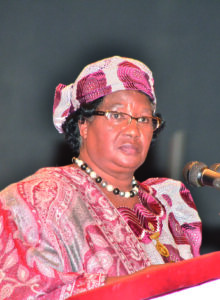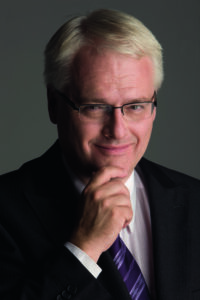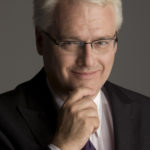Three Members of Club de Madrid are participating in the Culture Summit 2022 in Abu Dhabi next October 16-18. Joyce Banda, President of Malawi (2012-2014), Dalia Grybauskaitė, President of Lithuania (2009-2019), and Ivo Josipović, President of Croatia (2010-2015) will be discussing the role of culture in making resilient and shared societies, in a panel on 23-25 October 2022 from 9:15 to 10:00 (GMT+4).
You can watch the pannel live in the Culture Summit YouTube channel.
Organised by the Department of Culture and Tourism – Abu Dhabi, the 2022 edition continues its partnership with leading international arts, technology and media organisations to bring leaders in art and culture to Abu Dhabi for an extraordinary forum of knowledge exchange, debate, and policy development, taking place at Manarat Al Saadiyat, Abu Dhabi.
Culture Summit 2022 will address the theme of A Living Culture. It will reconsider the potential of collectivity, cultivating culture ecosystems, and embracing culture as lived experience.
Culture Summit convenes leaders from the field of arts, heritage, media, museums, public policy and technology, to identify ways in which culture can transform societies and communities worldwide
Our Members will participate in a panel about “The role of culture in making resilient and shared societies”, that will take place on 23 October from 9:15 to 10:15 (GMT+4). In this panel, they will explore and discuss the lessons learned from this pandemic and explore potential best practices that different governments can implement to ensure that all groups of society, particularly those more vulnerable, have access to cultural content and production – including in the digital world – which has proved to be an integral part of many people’s lives and wellbeing during this pandemic.
Club de Madrid Members will share their proposals on how to ensure that all citizens can become active contributors to our living culture and in this way promote a more inclusive and diverse society. Based on their experience advocating for the concept of Shared Society, panelists will share recommendations and best practices to ensure all groups of society have access to cultural content and also the opportunity to be active contributors to the production of culture. Shared Society is defined as one in which all individuals and constituent groups hold status as equally contributing participants, free to express their differences while integrating their voices within the broader population. It respects everyone’s dignity and human rights while providing every individual with equal opportunity.
Culture Summit is an extraordinary forum of knowledge exchange, debate, and policy development organised by the Department of Culture and Tourism of Abu Dhabi, in collaboration with global partner organisations, including UNESCO, Solomon R. Guggenheim Museum and Foundation, Economist Impact, Google, the Design Museum, among other art, technology, and media organisations from around the world.
With thoughtfully programmed panel discussions, keynotes, presentations, screenings, and conversations, Culture Summit harnesses the expertise of policy makers, researchers, artists, and culture professionals to examine urgent contemporary issues, which include the impacts of digital media and AI, creative ecosystems and indigenous practices, representation, and topographies of public space among many others. Each of the three days is organised to examine these subjects through a different lens: Living Cultural Ecosystems takes a sectoral perspective; Living in Culture considers people, communities, and futures; and Culture, Identity, Power focuses on diversity.
You can read here the full Cultural Summit 2022 Program.
The forum gathers the expertise of policy makers, researchers, artists and curators to examine contemporary issues driving change in the culture and creative industries (CCI) and the wider culture sector today. An overarching assumption driving discussion is that the pandemic, and the seismic shifts in cultural production and dissemination it induced, has shifted our relationship with culture, transforming it to a more living and dynamic part of our daily lives and experience. New cultural ecosystems characterized by greater fluidity, collaboration and resource sharing are emerging to support and sustain CCI. The radically evolving global media landscape provide both challenges and opportunities for preserving and promoting diversity of cultural expression and inclusion. In this solution-seeking Summit, three proposed sub-themes or streams investigate the overarching theme of A Living Culture. Each stream drives the day’s programme, channelling discussion aimed at generating
Club de Madrid panelists
Joyce Banda, President of Malawi (2012-2014) and Member of Club de Madrid
 An entrepreneur, activist, politician and philanthropist, Joyce Banda served as the President of the Republic of Malawi from 2012 to 2014. She was Malawi’s first female president and Africa’s second. Prior to assuming office, President Banda served as a Member of Parliament, Minister of Gender and Child Welfare, Foreign Minister, and Vice President of the Republic of Malawi. While serving as Minister of Gender and Child Welfare, she championed the enactment of The Prevention of Domestic Violence Bill (2006), which provided the legal framework to support the prevention and elimination of all forms of violence against women and girls. President Banda is credited for turning round an ailing economy which was on the verge of collapse in April 2012. In the areas of democracy, good governance, and rule of law, President Banda repealed a number of draconian laws which weakened essential democratic institutions, infringed upon civil liberties and restricted the freedom of the press. President Banda’s unwavering commitment to the promotion of women’s maternal health and reproductive rights led her to establish the Presidential Initiative on Maternal Health and Safe Motherhood, which spearheaded the fight against high maternal mortality rates and the promotion of safe motherhood in Malawi. President Banda is an international speaker and motivational speaker. She has delivered numerous lectures at universities including Harvard Medical School and the Kennedy School of Politics, the London School of Economics and Political Science, George Washington University, Kansas State University, among others.
An entrepreneur, activist, politician and philanthropist, Joyce Banda served as the President of the Republic of Malawi from 2012 to 2014. She was Malawi’s first female president and Africa’s second. Prior to assuming office, President Banda served as a Member of Parliament, Minister of Gender and Child Welfare, Foreign Minister, and Vice President of the Republic of Malawi. While serving as Minister of Gender and Child Welfare, she championed the enactment of The Prevention of Domestic Violence Bill (2006), which provided the legal framework to support the prevention and elimination of all forms of violence against women and girls. President Banda is credited for turning round an ailing economy which was on the verge of collapse in April 2012. In the areas of democracy, good governance, and rule of law, President Banda repealed a number of draconian laws which weakened essential democratic institutions, infringed upon civil liberties and restricted the freedom of the press. President Banda’s unwavering commitment to the promotion of women’s maternal health and reproductive rights led her to establish the Presidential Initiative on Maternal Health and Safe Motherhood, which spearheaded the fight against high maternal mortality rates and the promotion of safe motherhood in Malawi. President Banda is an international speaker and motivational speaker. She has delivered numerous lectures at universities including Harvard Medical School and the Kennedy School of Politics, the London School of Economics and Political Science, George Washington University, Kansas State University, among others.
Dalia Grybauskaitė, President of Lithuania (2009-2019) and Member of Club de Madrid
 Dalia Grybauskaitė is the former President of the Republic of Lithuania. She served as President from 2009 to 2019. She was the country’s first woman President and the only President in Lithuania’s post-Soviet history to have served two consecutive terms. After the deepening global economic crisis in 2009, Grybauskaitė left her EU post of Commissioner to run as an independent candidate in Lithuania’s presidential election. Touting her extensive experience in finance and economics, she registered an overwhelming victory. After taking office in July 2009, Grybauskaitė focused on lifting the country’s economic fortunes. In May 2014 she won re-election. During the second term, she emphasized Lithuanian military readiness and welcomed a NATO battle group as part of the Alliance’s “enhanced forward presence” in Lithuania. While serving as European Union Commissioner for Financial Programming and Budgets, she was elected Commissioner of the Year in 2005. She also served as Finance Minister for Lithuania from 2001 to 2004. Dalia Grybauskaitė served as Minister Plenipotentiary in the Lithuanian Mission to the European Union, Deputy Chief Negotiator for Lithuania’s Association Agreement with the European Union, and Minister Plenipotentiary in the Lithuanian Mission to the United States. At the Ministry of Foreign Affairs, she was Director of the Economic Relations Department, responsible for economic diplomacy and development assistance. She also was Chief Negotiator for Lithuania’s Free Trade Agreement with the European Union. Grybauskaitė holds a bachelor’s degree in Political Economy from Saint Petersburg State University and a Doctorate in Economics from the Moscow Academy of Public Sciences. She is also Doctor of Humane Letters, Honoris Causa, at Georgetown University. Dalia Grybauskaitė remains widely popular with the Lithuanian public after ending her second and final second presidential term in July 2019. She serves on a number of advisory boards and commissions, including the Council of Women World Leaders, the Board of Trustees of “Friends of Europe”, and she is Co-chair of the UN High-Level Panel on International Financial Accountability, Transparency and Integrity (FACTI).
Dalia Grybauskaitė is the former President of the Republic of Lithuania. She served as President from 2009 to 2019. She was the country’s first woman President and the only President in Lithuania’s post-Soviet history to have served two consecutive terms. After the deepening global economic crisis in 2009, Grybauskaitė left her EU post of Commissioner to run as an independent candidate in Lithuania’s presidential election. Touting her extensive experience in finance and economics, she registered an overwhelming victory. After taking office in July 2009, Grybauskaitė focused on lifting the country’s economic fortunes. In May 2014 she won re-election. During the second term, she emphasized Lithuanian military readiness and welcomed a NATO battle group as part of the Alliance’s “enhanced forward presence” in Lithuania. While serving as European Union Commissioner for Financial Programming and Budgets, she was elected Commissioner of the Year in 2005. She also served as Finance Minister for Lithuania from 2001 to 2004. Dalia Grybauskaitė served as Minister Plenipotentiary in the Lithuanian Mission to the European Union, Deputy Chief Negotiator for Lithuania’s Association Agreement with the European Union, and Minister Plenipotentiary in the Lithuanian Mission to the United States. At the Ministry of Foreign Affairs, she was Director of the Economic Relations Department, responsible for economic diplomacy and development assistance. She also was Chief Negotiator for Lithuania’s Free Trade Agreement with the European Union. Grybauskaitė holds a bachelor’s degree in Political Economy from Saint Petersburg State University and a Doctorate in Economics from the Moscow Academy of Public Sciences. She is also Doctor of Humane Letters, Honoris Causa, at Georgetown University. Dalia Grybauskaitė remains widely popular with the Lithuanian public after ending her second and final second presidential term in July 2019. She serves on a number of advisory boards and commissions, including the Council of Women World Leaders, the Board of Trustees of “Friends of Europe”, and she is Co-chair of the UN High-Level Panel on International Financial Accountability, Transparency and Integrity (FACTI).
Ivo Josipović, President of Croatia (2010 – 2015) and Member of Club de Madrid
 Ivo Josipović is a former President of the Republic of Croatia, serving between 2010-2015. He graduated from the University of Zagreb, where he studied Law and Music at the Faculty of Law and the Music Academy, respectively. Before his presidential tenure, Josipović was a university professor, Member of Parliament, and composer. He was also the Director of the Music Biennale Zagreb – International Festival of Contemporary Music and the Secretary-General of the Croatian Composers Union. After his mandate, Ivo Josipović returned to his position as a professor at the University of Zagreb and continued his career as a composer. At the Faculty of Law of the University of Zagreb, Ivo Josipović is a professor of Criminal Procedure and International Criminal Law. He has published several books, research papers, and articles on the topics of international criminal law, criminal procedure, and human rights, both in Croatian and foreign journals. As a politician, Ivo Josipović is dedicated to promoting peace in the region, fighting against corruption, and defending human rights. As a composer, he has produced around 60 pieces. Aside from his career as a university professor and composer, Ivo Josipović is an active member of many cultural, legal, scientific, and human rights organisations, both national and international. He is a patron of the European Academy of Art and Science, a Board Member of NGIC, and a member of the World Academy of Art and Science and the Croatian Composers Society, among other organisations. He has received many international awards and several honoris causa doctorates in Art, Legal Science, and Politics.
Ivo Josipović is a former President of the Republic of Croatia, serving between 2010-2015. He graduated from the University of Zagreb, where he studied Law and Music at the Faculty of Law and the Music Academy, respectively. Before his presidential tenure, Josipović was a university professor, Member of Parliament, and composer. He was also the Director of the Music Biennale Zagreb – International Festival of Contemporary Music and the Secretary-General of the Croatian Composers Union. After his mandate, Ivo Josipović returned to his position as a professor at the University of Zagreb and continued his career as a composer. At the Faculty of Law of the University of Zagreb, Ivo Josipović is a professor of Criminal Procedure and International Criminal Law. He has published several books, research papers, and articles on the topics of international criminal law, criminal procedure, and human rights, both in Croatian and foreign journals. As a politician, Ivo Josipović is dedicated to promoting peace in the region, fighting against corruption, and defending human rights. As a composer, he has produced around 60 pieces. Aside from his career as a university professor and composer, Ivo Josipović is an active member of many cultural, legal, scientific, and human rights organisations, both national and international. He is a patron of the European Academy of Art and Science, a Board Member of NGIC, and a member of the World Academy of Art and Science and the Croatian Composers Society, among other organisations. He has received many international awards and several honoris causa doctorates in Art, Legal Science, and Politics.

